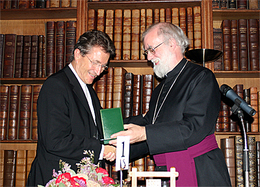Archbishop awards Nikæan Cross to Bishop Huber
 The Archbishop awards the Rt Revd Dr Wolfgang Huber the Nikaean Cross
The Archbishop awards the Rt Revd Dr Wolfgang Huber the Nikaean CrossThursday 10th September 2009
The Nikæan Club's Annual Dinner welcomed 126 members and guests in The Great Hall at Lambeth Palace. The Archbishop of Canterbury welcomed Bishop Wolfgang Huber as Guest of Honour. Following the speeches, (available below), the Archbishop presented Bishop Huber, Chairman of the Council of the Evangelical Church in Germany, with The Nikæan Cross for services to ecumenism.Transcript of the Archbishop's Speech:
Reverend Fathers, Brothers, Sisters, Ladies and Gentlemen. It's a great pleasure to welcome you here this evening for another very joyful and very special occasion for the Nikæan Club. I'm sure that you would like me to thank on your behalf all those who have prepared and served our meal this evening. I think we've been very well looked after.
I feel that I should also thank the librarian and the staff of the Lambeth Palace Library for allowing us into this 'sacred' library space this evening. I know that they're always a little bit apprehensive that we're going to throw food at the books, but I can always assure them that the Nikæan Club is generally fairly well behaved at least, until this stage in the evening.
It's a particular pleasure to welcome Bishop Huber and Frau Huber as our guests tonight. Bishop Huber has had a very, very distinguished career indeed in the Evangelical Church in Germany, both as a scholar and researcher, and as a bishop and a church leader, and now holding the senior episcopal position in the Evangelical Church in Germany (EKD).
Bishop Huber has contributed memorably and effectively to theological debate in general: to debate on public and ethical questions in particular, not only in Germany but in the whole European context. And (as I can testify with great warmth of feeling) he has been a faithful friend to the Church of England and has furthered the relationship created through the Meissen Agreement with great enthusiasm and great commitment.
I have the happiest of memories of the time when we jointly chaired the meeting of the theological section of the Meissen commission in Berlin some years ago as part of the commemoration of the centenary of Dietrich Bonhoeffer. Bonhoeffer's work has been a focus for Bishop Huber's enthusiasm and research for many years and it's been one of those areas where we've found a great deal of common ground and common appreciation.
It's sometimes said with, sadly, a degree of truth that certainly in the last couple of hundred years the Church of England has not taken its Reformed partners on the Continent of Europe with the seriousness they deserve. It has developed its own varieties of Reformed Protestantism and has sometimes found that its most natural partner in dialogue is the Roman Catholic Church.
And yet, if we look back to our independent Anglican origins the sense of belonging to a conversation among what was sometimes wonderfully called 'the best reformed churches' was very much part of the Anglican identity in the early decades after the Reformation. Facing as we do, highly complex and rapidly changing societies, and facing them as Churches deeply rooted in and involved in the political lives of our nations. It's more than ever important that the German Church and the Church of England develop not only a sympathetic and intelligent mutual understanding, but a capacity to speak together in the European context on many of the issues of the age. We've been speaking over dinner about some of those issues: about the issues of bio-ethics, about issues of economic ethics. All those issues that press so hard upon all of us. And I know that we share a concern that the churches in Europe; Catholic and Reformed, should together help Europe itself to form a sense of its moral identity and it's moral vocation so that the European Union becomes something just a little bit more than a financial convenience.
The Euro is no doubt a very important institution but in and of itself it doesn't create that shared moral vision. So the Meissen Agreement has in the years past, been an opportunity to share experience between the English and the German churches, to share our perspectives and our vision, and to share something of what we believe we have to contribute to the on-going conversation about the identity and the future of Europe itself, in a world of instability and violence and injustice.
In the post-war period our nations have grown together in any number of ways. We have, by the grace of God, been enabled in Europe to think about what reconciliation might concretely mean. We have something to share with the wider world, and that is why it is important that this particular conversation with our German brothers and sisters should continue, and be the focus of our energy and our commitment. It's why I'm truly delighted to welcome you tonight, Wolfgang, in our midst as a valued friend and colleague, and to invite you to address us.
